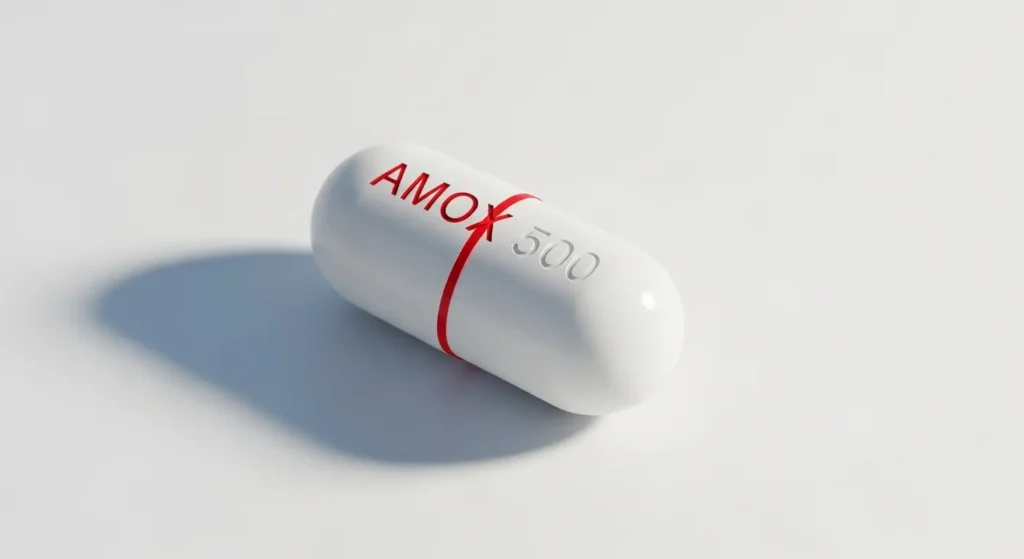If you’re worried about amoxicillin hair loss, you’re not alone. Some patients report hair shedding after taking antibiotics, raising questions about whether amoxicillin directly causes this side effect.
In this article, we’ll explain the possible connection, outline recovery timelines, share expert-backed strategies to support regrowth, and highlight when to seek medical help.
With evidence-based insights, timelines, and actionable tips, you’ll feel reassured and informed about how to manage this concern effectively.
Understanding the Issue – Amoxicillin & Hair Loss

What is Amoxicillin?
Amoxicillin is a widely prescribed antibiotic from the penicillin family. It is commonly used to treat bacterial infections such as ear infections, sinus infections, bronchitis, pneumonia, and urinary tract infections.
Reports of Hair Loss Linked to Amoxicillin
While hair loss is not listed as a common side effect, there are anecdotal reports of patients experiencing shedding while on amoxicillin or shortly afterward. Medical literature indicates that antibiotics, including amoxicillin, may trigger a condition called telogen effluvium, a form of temporary hair shedding.
Mechanisms: How Antibiotics May Cause Hair Loss
Antibiotics may influence hair growth in several indirect ways:
- Disruption of gut microbiome – reduces production of essential B vitamins and nutrients crucial for hair health.
- Nutrient absorption issues – long courses of antibiotics can deplete iron, zinc, or biotin.
- Telogen effluvium trigger – amoxicillin may stress the body, causing more hairs to shift into the resting (shedding) phase.
Timeline & Patterns of Antibiotic-Related Hair Loss
Typical Onset
Hair shedding usually appears 2–3 months after starting or completing antibiotics. This delay happens because hair follicles need time to transition into the telogen (resting) phase before shedding occurs.
Duration & Recovery
- Temporary shedding – Most cases resolve naturally.
- Recovery window – New growth typically appears within 3–6 months once the medication is stopped and the body restores balance.
- Complete regrowth – In the majority of cases, hair returns to baseline thickness.
Expert Insights & Medical Context
What Medical Literature Says
Dermatologists classify drug-induced hair loss under two categories:
- Telogen effluvium – common, temporary shedding caused by stress or medication.
- Anagen effluvium – rapid loss, usually linked to chemotherapy, not antibiotics.
Amoxicillin-related cases almost always fall into the category of telogen effluvium, meaning they are temporary and reversible.
When to Consult a Doctor
- If shedding continues longer than 6 months
- If you notice patchy bald spots instead of diffuse thinning
- If hair loss is accompanied by fatigue, weight loss, or other symptoms, it may indicate another underlying cause.
Pro Tip: Always consult your prescribing doctor before discontinuing antibiotics. Stopping early can cause antibiotic resistance or incomplete infection recovery.
Proactive & Supportive Measures for Reversal
Nutritional Support
Antibiotics can deplete nutrients. Supporting your diet can speed recovery:
- B vitamins & Biotin – support keratin production
- Iron-rich foods – spinach, red meat, legumes
- Omega-3 fatty acids – salmon, chia seeds, flaxseed
- Protein intake – essential for follicle health
Lifestyle & Scalp Care Tips
- Avoid harsh chemical treatments during the shedding phase
- Massage the scalp gently to improve circulation
- Manage stress with relaxation techniques (yoga, meditation, walks)
Safe Hair Growth Aids (with Medical Guidance)
- Topical Minoxidil – may help stimulate follicles
- PRP therapy – sometimes recommended for severe shedding
- Dermatology check-ups – to rule out nutritional deficiencies or thyroid issues

Common FAQs – Addressing Reader Concerns
Does amoxicillin directly cause hair loss?
Not directly. It may contribute to temporary telogen effluvium in sensitive individuals.
How long does it take for hair to grow back after antibiotics?
Most patients notice regrowth within 3 to 6 months after the antibiotic course ends.
Should I stop taking amoxicillin if I notice hair loss?
No. Always consult your doctor first. Stopping antibiotics early can worsen infections.
Are there other antibiotics that may cause hair loss?
Yes—tetracyclines, penicillins, and cephalosporins have been linked to similar cases.
Can I prevent hair loss while taking antibiotics?
Supporting your body with good nutrition, hydration, and stress management may reduce risk.
Final Advice
Amoxicillin is a highly effective antibiotic, and while hair loss is a rare side effect, it can occur due to temporary telogen effluvium. The good news is that this shedding is usually reversible, with regrowth expected within a few months.
By supporting your health with balanced nutrition, proper scalp care, and medical guidance, you can minimize the impact and encourage recovery.
If you’re concerned about amoxicillin hair loss or experiencing unusual shedding, don’t ignore it. Book a consultation with Dr. Rana Irfan, a leading hair restoration specialist in Islamabad, to receive personalized advice, diagnosis, and treatment options tailored to your condition.
